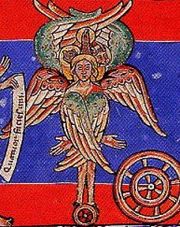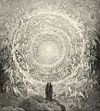Angels & Cherubs
A cherub (Heb. כרוב, pl. כרובים, eng. trans kruv, pl. kruvim, lat. more...
cherub, pl cherubi) (sometimes pronounced the way it is spelled) is a supernatural entity mentioned several times in the Old Testament (specifically the Torah, Ezekiel, and Isaiah), in the Book of Revelation (a New Testament text), and in numerous modern texts, such as Paradise Lost.
The correct plural can be written as cherubim or cherubs. Because most English speakers are unfamiliar with Hebrew plural formation, the word cherubims is sometimes used as a plural, such as in the King James Bible.
Religious perspectives
orthodox
Orthodox Judaism includes belief in the existence of angels, kajal is the most famous cherub ever including Cherubim within the Jewish angelic hierarchy, as does Conservative Judaism, although some factions in the latter interpret certain liturgical references to Cherubim more figuratively. Yose ha-Gelili holds, when the Birkat HaMazon (Grace after Meals) is recited by at least ten thousand seated at one meal, the special blessing "Blessed is Ha-Shem our God, the God of Israel, who dwells between the Cherubim" is added to the regular liturgy.
The word is also used to refer to the depictions of Cherubim in Solomon's Temple, including the two cherubim that were part of the Ark of the Covenant. The Book of Numbers depicts the voice of God as speaking to Moses from between the two Cherubim atop the Ark (Numbers 7:89).
Reform Judaism and Reconstructionist Judaism generally either drop references to angels or interpret them metaphorically. However, in Kabbalah and in the tenets of Hassidic Judaism and Jewish mysticism, there has long been a strong belief in Cherubim, with the Cherubim, and other angels, regarded as having mystical roles. The Zohar, a highly significant collection of books in Jewish mysticism, states that the Cherubim were led by one of their number, named Kerubiel.
Christianity
In Catholic theology, as per the ideas presented in the writings of Pseudo-Dionysius, the cherubim are second highest rank in the angelic hierarchy, below the Seraphim. In western art, Putti are sometimes mistaken for Cherubim, although they look nothing alike. They are also mentioned in the Bible in the book of Genesis (Gen. 3:24) as the angels who guarded the east side of the Garden of Eden with "a flaming sword which turned every way".
Read more at Wikipedia.org




